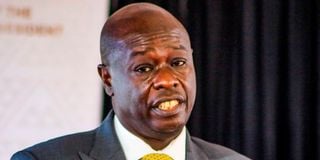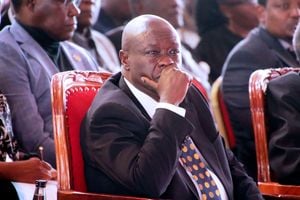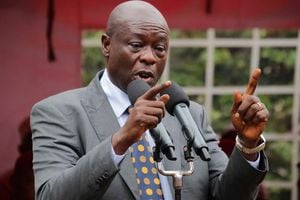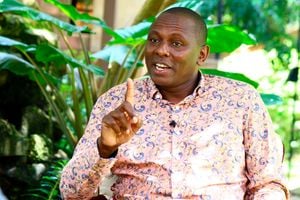
Deputy President Rigathi Gachagua.
President William Ruto’s allies have started testing political waters for a possible impeachment motion against Deputy President Rigathi Gachagua through a censure motion in the Senate.
Tana River Senator Danson Mungatana filed the motion over what he termed Mr Gachagua’s unbecoming conduct that has continued to demean the office of the Deputy President.
Appearing to make the first move amid widening rift within the Kenya Kwanza government, the senator accused Mr Gachagua of failing to promote national unity with his divisive public utterances.
Mr Mungatana said that the DP, as a State officer and the principal assistant to the President, is expected to at all times uphold and safeguard the constitution, promote and enhance the unity of the nation, and promote respect for the diversity of the people and communities in Kenya.
But, according to the senator, the DP has been making utterances that have marginalised sections of Kenyans, and created and continues to heighten tension among ethnic communities in utter disregard of Article 75 of the Constitution since assuming office.
The article requires State officers to behave, whether in public or private life, in a manner that avoids any conflict between personal interests and public or official duties or demeans his or her office. Contravention of the provision could lead to disciplinary procedures that may lead to the dismissal of the officer or removal from office.
Some of the allegations made by Mr Mungatana include Mr Gachagua’s utterances regarding employment opportunities in the public service, allocation of resources to the devolved units and incitement of a section of Kenyans to disobey lawful directives by county governments.
“If I were an MP and an impeachment motion was brought to the House, I would sign it immediately because the Deputy President is not conducting himself in a manner befitting his office,” said Mr Mungatana.
Political storm
“When you are censured, it is a strong disapproval of your conduct. Although it cannot remove you from office, the House can decide on the consequences. We will debate on how we want the holder of such an office to behave. It is not right for a Deputy President to interfere with the work of counties,” he added.
Mr Gachagua has been in the eye of a political storm since assuming office in 2022 when he intimated that the Kenya Kwanza administration is like a shareholding company where those who voted for the ruling regime should get preferential treatment. He further said that he will be the DP for Mt Kenya region fighting for their interests as the President focuses on other parts of the country.
Recently, he asked Nairobi Governor Johnson Sakaja not to relocate Wakulima Market traders to Kangundo Road Market since they voted for the latter in 2022 and he should therefore listen to their grievances as a way of paying them back.
A section of political leaders have poured cold water on Mr Mungatana’s motion.
Homa Bay Senator Moses Kajwang’ termed the motion a “trial balloon to see the numbers in the Senate in the event of an impeachment motion against the DP”.
“I see it as an abuse of the time and mandate of the Senate. If senators are required to sit as judges in the impeachment trial of a Deputy President, we should not show our bias by discussing a censure motion,” he said.
ODM Deputy Party Leader Godfrey Osotsi said Kenya has serious issues that require the attention of Parliament and a censure motion is not one of them.
“We must be alive to the fact that issues raised by Gen Z have not been dealt with. We also have other critical matters like delayed disbursement to counties that should be of high priority to the Senate,” said the Vihiga Senator.
Nyeri Governor Mutahi Kahiga added that the Senate should concentrate more on matters devolution and protecting counties instead of playing politics.
He argued that the motion is testing waters, saying it will be setting a bad precedence by having the presidency discussed by the House.
“I don’t think the direction he is taking is the way to go. Everyone talks about their home and their people and it is not wrong to identify with your tribe if your ID and birth certificate already do so,” said Mr Kahiga.
“It is not criminal to talk about your community or where you come from. Why are we applying double standards? The bottom line is to calm the nation because for every action there will be a reaction,” he added.
But Mr Mungatana defended himself against accusations of testing the waters with the motion, saying he is just exercising his constitutional mandate.
“I have had no opportunity to meet the President, this is a matter I am doing in my capacity as a senator. As a senator, I have the capacity to bring any motion or legislative agenda before the Senate,” said Mr Mungatana.
There have been claims that those close to the President are planning to impeach Mr Gachagua. The DP himself recently said that if such a motion was to be brought to Parliament, then it would be with the blessings of the President.
At least eight names from diverse counties in Mt Kenya region are already being flouted to take the DPs seat even before the motion, which Mr Gachagua and the President’s allies have said could come as early as next week, is tabled.
They are Interior Cabinet Secretary Kithure Kindiki, Council of Governors chair and Kirinyaga Governor Anne Waiguru, National Assembly Majority Leader Kimani Ichung’wa, Kiharu MP Ndindi Nyoro, Embu Governor Cecily Mbarire, Laikipia East MP Mwangi Kiunjuri and Tourism and Wildlife Cabinet Secretary Rebecca Miano.
However, Mr Ichung’wah has dismissed the claims of an impending impeachment motion against DP Gachagua.
Speaking in Siaya recently, Mr Ichung’wah said that no MP has attempted to collect signatures for such a motion.
“As the Majority Leader, I can tell Kenyans there has never been any impeachment plans against him (DP),” said the Kikuyu MP.
But fuelling the speculations of a looming impeachment was Kapseret MP Oscar Sudi, a close ally of the President, through a post on his social media platforms: “Maximum two weeks,” which many interpreted as a sign that significant political action would occur soon.
As one of MPs accused of having been tasked with crafting the impeachment motion, Suna East MP Junet Mohamed said it is his constitutional mandate to exercise the provision of the Constitution but at his own time and when he wants it. He, however, did not disclose whether such a plan is in the pipeline.
“Am I not an MP elected by Suna East people? So if I want to exercise my constitutional mandate I can do it when I want to do it,” said the National Assembly Minority Leader. “I will decide when I want to do it. It is my secret weapon. It is a constitutional right I have been given and I will exercise it at my discretion, when I see it to be fit,” he added.
But as talk of an imminent impeachment motion gathers steam, it is not a walk in the park to remove a Deputy President from office.
According to Article 150 of the Constitution, a DP may be removed from office on the grounds of physical or mental incapacity, or impeachment.
Impeachment can be on the grounds of a gross violation of the constitution or any other law, committing a crime under national or international law, or gross misconduct.
Convene meeting
To impeach a DP, an MP supported by at least a third of all the members, in this case 117 MPs out of 349, may move a motion for the impeachment on either of the three grounds. If at least two-thirds of the MPs, in this case 233, support the motion, the National Assembly Speaker shall inform the Senate counterpart of that resolution within two days.
Within seven days after receiving the notice, the Speaker of the Senate shall convene a meeting of the Senate to hear the charges against the DP. The Senate, by resolution, may appoint a special committee of 11 of its members to investigate the matter.
The special committee shall investigate the matter and report to the Senate within 10 days on whether the allegations against the DP were substantiated. The DP shall have the right to appear and be represented before the special committee.
If the special committee reports that the particulars of any allegation have not been substantiated, further proceedings shall not be taken. Conversely, if it reports that the particulars of any allegation have been substantiated, the Senate shall, after giving the DP an opportunity to be heard, vote on the impeachment charges.
If at least two-thirds of the senators, in this case 47 out of 67, vote to uphold any charge, the DP shall cease to hold office.
In the case of removal on grounds of incapacity, an MP supported by at least a quarter of all members may move a motion for the investigation of the DP. The MPs will investigate the DP’s physical or mental capacity to perform the functions of the office.
If a majority of the MPs in the National Assembly support the motion, the Speaker shall inform the Chief Justice of that resolution within two days. Within seven days after receiving the notice, the Chief Justice shall appoint a tribunal consisting of three doctors, one advocate of the High Court and one person nominated by the DP or a member of the family. The tribunal shall inquire into the matter and, within 14 days report to the Chief Justice and Speaker of the National Assembly.
If the tribunal reports that the DP is incapable of performing the functions of the office, the National Assembly shall vote on whether to ratify the report. If a majority of members vote in favour of ratifying it, the DP shall cease to hold office.












